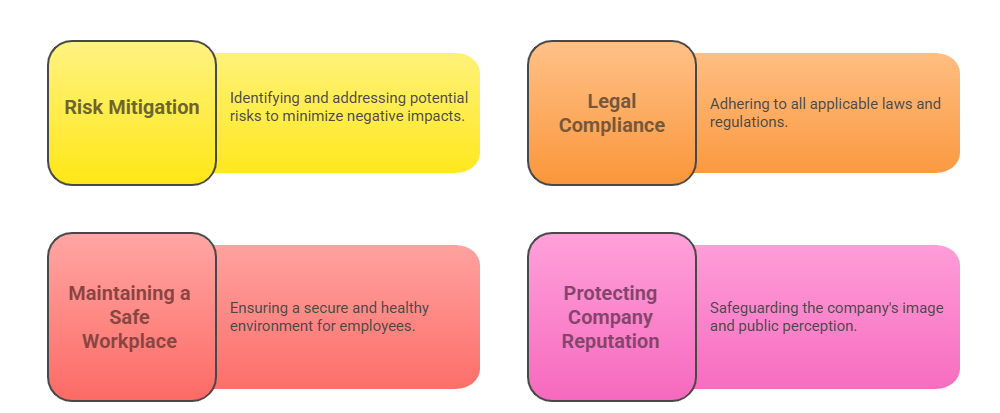Table of Contents
TogglePre-employment screening is a systematic process undertaken by employers to evaluate the suitability of candidates for a particular job role. This comprehensive method entails learning about a candidate’s employment history, education, and even criminal and personal histories. Making educated recruiting decisions, reducing risks, and guaranteeing the general security and safety of the workplace are the main objectives.
Introduction
Organizations are resorting increasingly to pre-employment screening as an essential step in their hiring process in the highly competitive modern job market. This practice goes beyond the traditional job interview and resume review, aiming to provide employers with a more comprehensive understanding of potential candidates. In this blog post, we’ll demystify the pre-employment screening process, exploring its purpose, the various types of checks involved, and why it has become an indispensable component of hiring.
Types of Pre-Employment Checks
Criminal Background Checks
One of the most common types of pre-employment screenings, criminal records checks, aims to identify any criminal history a candidate may have. Employers conduct these checks to assess potential risks associated with hiring an individual, especially for positions involving sensitive information or a high level of responsibility.
Employment History Check
Employment history check involves confirming the accuracy of the information provided by a candidate regarding their work history. This check ensures validating employment credentials such as designation, tenure, exit reason, conduct, etc.
Education Verification
Employers often verify the educational credentials of candidates to confirm the accuracy of their academic qualifications. This check is vital in ensuring that candidates possess the required knowledge and skills for the job.
Identity verification
Identity verifcation ensures that an individual is who they claim to be. OnGrid offers quick and reliable verification of government-issued IDs like Aadhaar, Voter ID, and Driving Licence. These checks help businesses confirm identity, prevent fraud, and stay compliant with regulatory norms. Learn more at OnGrid Identity Verification.
Reference Checks
Reference checks involve contacting the listed references to gather insights into a candidate’s work ethic, performance, and interpersonal skills. This provides employers with valuable perspectives from individuals who have worked closely with the candidate in the past.
Read also: Everything to know about eLockr Reference Check (EREF)
Drug Test
A pre-employment drug test is a screening procedure conducted by employers to assess whether job applicants are free from the use of illicit drugs or substances.
Why is Pre-Employment Screening Required?

Risk Mitigation
Pre-employment screening assists companies in determining the possible risks involved in selecting a specific candidate. This is very important, particularly for jobs that deal with sensitive data, have financial obligations, or deal with vulnerable groups of people.
Legal Compliance
Adherence to legal and regulatory standards is mandatory in all industries. Pre-employment screening helps organizations adhere to these standards, ensuring that they are not exposed to legal risks associated with negligent hiring.
Maintaining a Safe Workplace
For employers, ensuring employee and workplace safety is of utmost importance. Organizations can find individuals with a history of violence, drug misuse, or other behaviours that could jeopardize workplace safety by running background checks on them.
Protecting Company Reputation
Hiring individuals with doubtful backgrounds might negatively impact a company’s reputation. Organizations can prevent situations where an employee’s conduct could reflect poorly on the firm by doing pre-employment screening.
Conclusion
In conclusion, pre-employment screening is a vital and multifaceted process that goes beyond the surface-level evaluation of candidates. It plays a pivotal role in ensuring that organizations make well-informed hiring decisions, mitigate risks, and create a safe and secure work environment.
While the types of checks involved may vary based on the industry and the nature of the job, the overarching goal remains the same — to build a workforce that contributes positively to the success and reputation of the organization. Pre-employment screening will always be a crucial part of the recruiting process as the job market changes, assisting companies in making decisions that support their core beliefs and corporate objectives.
Q1. What is pre-employment screening and why is it important?
Pre-employment screening is a process used by employers to verify a candidate’s background before hiring. It helps in making informed hiring decisions, reducing risks, and ensuring workplace safety.
Q2. What types of checks are included in pre-employment screening?
Common checks include criminal background verification, employment history, education verification, identity checks (like Aadhaar or Driving Licence), reference checks, and drug tests.
Q3. How does identity verification work in background checks?
Identity verification confirms that a candidate is who they claim to be. It typically involves validating government-issued IDs such as Aadhaar, Voter ID, or Driving Licence.
Q4. Is pre-employment screening legal in India?
Yes, pre-employment screening is legal in India as long as it complies with privacy and data protection laws and the candidate’s consent is obtained.
Q5. Can a candidate be rejected based on background verification?
Yes, if discrepancies are found in employment, education, criminal records, or if the identity is unverifiable, an employer may decide not to proceed with the hire.





Leave a Reply